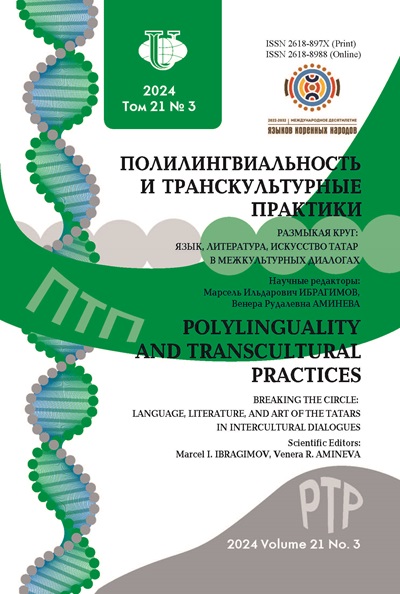Issue
Title
Authors
|
Orlova E.V. |
|
Baraldo del Cerro M.L., Baghana J. |
|
Fomenko G.N., Murashova O.V. |
|
Krasnykh V.V. |
|
Budiltseva M.B., Novikova N.S. |
|
Leifa I.I. |
|
Zakoyan L.M. |
|
Zharkova E.H., Nazartseva E.A. |
|
Gartsov A.D. |
|
Alimova M.V. |
|
Gagarina N.V. |
|
Rudenko-Morgun O.I., Dounayeva L.A., Arkhangelskaya A.L. |
|
Bejenari O.A. |
|
Akhmatova M.A., Dodueva A.T., Ketenchiev M.B. |
|
Mishina N.Y., Antonov E.A. |
|
Suprun V.I. |
|
Khukhuni G.T., Valuitseva I.I. |
|
Dianova L.P. |
|
Agmanova A.Y., Asmagambetova B.M. |
|
Rudenko-Morgun O.I., Arhangel’skaja A.L., Al’-Kaysi A.N. |
|
Maslova O.V. |
|
Anipkina L.N. |
|
Derbisheva Z.K. |
|
YueBo Z. |
|
Dolzhikova A.V., Pomortseva N.V., Kurilenko V.B., Ivanova A.S., Kulikova E.U. |
|
Rumyantseva N.M., Yurova Y.V. |
|
Sokolova L.I. |
|
Kakhovskaya Y.V. |
|
Mikheeva N.F. |
|
Essina Z.I. |
|
Novikova M.L. |
|
Baghana J. |
|
Wenqian Zang -. |
|
Novikova A.K. |
|
Khamraeva E.A. |
|
Rogova A.V. |
|
Kobilskaia I.I. |
|
Bondarenko E.V. |
|
Barkan A.I. |
|
Pashkovskaya S.S. |
|
Arkhangelskaya A.Z., Zhigunova O.M., Zhindaeva A.G. |
|
Malysheva N.A. |
|
Romero Intriago D.I. |
|
Pugachev I.A., Yarkina L.P. |
|
Rozanova S.P. |
|
Mallaeva Z.M., Magomedov M.A., Khalidova R.S. |
|
Baziyeva G.J., Uzdenova F.T. |
|
Osmanzade A.O. |
|
Kyuchukov H., Samko M. |
|
Razumovskaya V.A., Kononova V.A. |
|
Dzhusupov M. |
|
Molchanova I.I. |
|
Tumanova S.R. |
|
Bondareva O.V. |
|
Dagbaeva O.I. |
|
Chzhan Uebo -. |
|
Kozlovskaya E.S. |
|
Saricheva E.A., Yakushev V.V. |
|
Nedosugova A.B. |
|
Sorokina E.V. |
|
Saranina I.I. |
|
Toursidou N.Y. |
|
Banshchikova М.A. |
|
Nazartseva E.A., Chauzova L.I. |
|
Budiltseva M.B., Varlamova I.J., Novikova N.S. |
|
Voropayeva Y.A. |
|
Nevmerzhitskaya E.V. |
|
Lizunova I.I. |
|
Dunaeva L.A., Apakina L.V. |
|
Alexeeva I.S. |
|
Zhuravleva Y.A., Agmanova A.E. |
|
Khukhuni G.T., Valuitseva I.I. |
|
Khakuasheva M.A., Kazieva A.M. |
|
Dzhusupov M. |
|
Vinogradova E.N., Klobukova L.P. |
|
Anikina M.N. |
|
Preobrazhenskij S.J., Konovalova D.G. |
|
Debrenne M. |
|
Lavitski A.A. |
|
Antonyuk E.V. |
|
Akhnina K.V. |
|
Baghana J. |
|
Iakovleva S.A. |
|
Ivanova E.N. |
|
Kurilenko V.B., Makarova M.A. |
|
Balykhina T.M., Cherkashina T.T. |
|
Maslova O.V. |
|
Alhasov Y.K. |
|
Orlova E.V. |
|
Novikova N.S., Budiltseva M.B. |
|
Kiynova J.K. |
|
Shevchenko A.V. |
|
Baghana J., Treschova N.V. |
|
Medvedev A.N., Tarasova D.A. |
|
Matalova S.V. |
|
Karpina E.V. |
|
Bozhko E.N. |
|
Lutin S.A. |
|
Danilova M.V. |
|
Gosteva J.N. |











